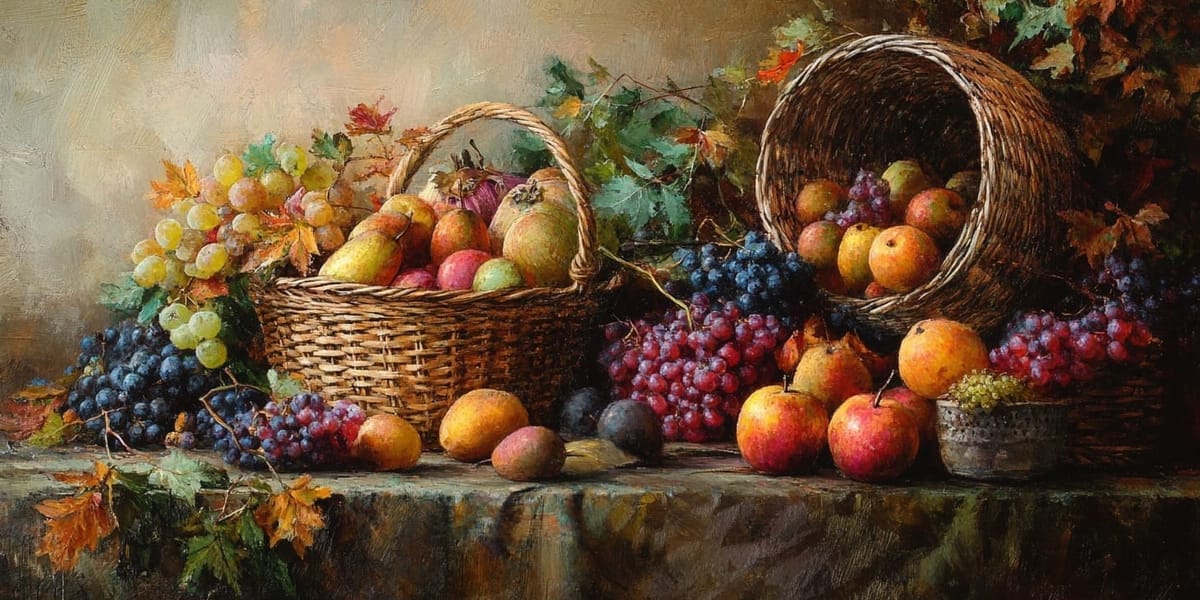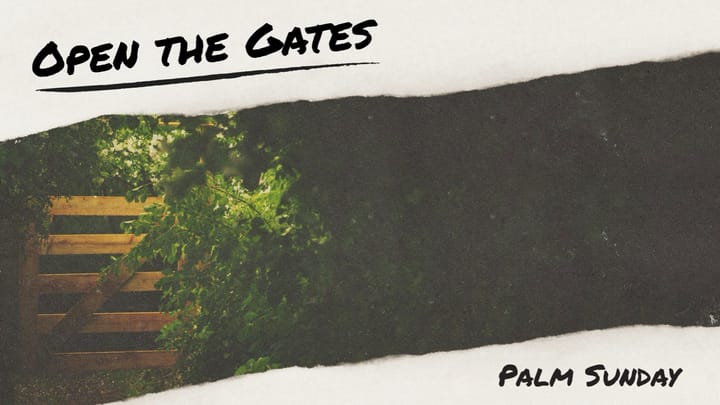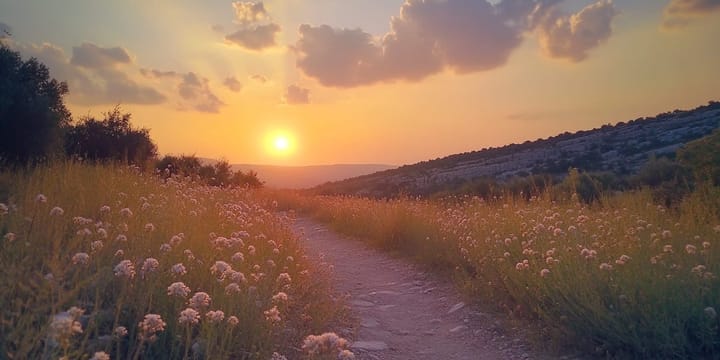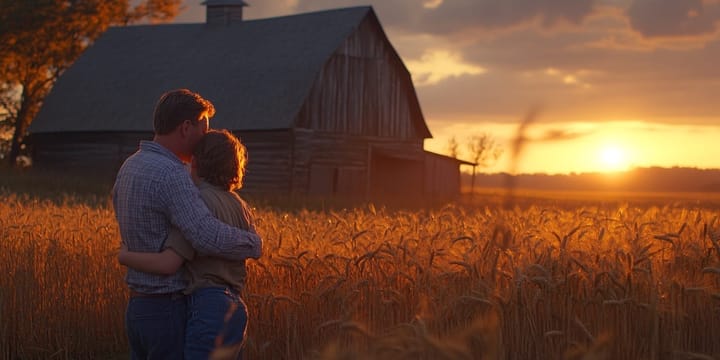Fairhaven Sermon 11-3-2024

In this week's service, Pastor Rev. Peg Bowman reflected on the theme of "God is always enough" as introduced in a new preaching series called Enough. She emphasized the importance of trusting God's provision and supply, not just for our personal needs but also for the needs of others. Bowman pointed to the example of a farmer who had planted seeds in their fields, and as they grew into harvests. God provides for us as we share our gifts with others.
Pastor Bowman used several biblical references, including Deuteronomy 6 and Leviticus 19, to illustrate the commandment of loving God with all one's heart and loving one's neighbor as oneself. She also shared a personal anecdote about planting seeds in their life, which grew into fruitful harvests. Bowman encouraged the congregation to listen for God's guidance and share their gifts with others, trusting that God will provide. The sermon also touched on the theme of generosity and the rule of community, emphasizing that God's house is a house of love and generosity.
Transcript
Well, welcome to All Saints Sunday. Today, of course, is the day when we remember all the people who have lived lives of faith in God, and especially those who have been important to us in our lives. And even though we miss these friends and family members who are no longer with us, we believe we will see them again in the next world, and we give thanks to God for the things that we shared with them in this world. And at the end of the sermon, we will remember these people, and in my case, an animal by name.
Today is also two days before election day, not that I need to tell you all that, and wanted just to encourage you to pray for our candidates, not just for the top offices. Pray God will give voters wisdom as they vote. May God's will be done for our nation, and please, again, please call or email either me or Jamie, but Spencer, if you know of anyone who needs a ride to the polls, because it's important for every voice to be heard. May Tuesday be a day spent under God's wings from beginning to end.
So this week, we're also launching a new preaching series called Enough. And by enough, we do not mean had enough, but as in God is always enough, and God will always supply the needs of God's people. As children of God, we will always have enough. And so yes, this is a series on giving, and it will include a pledge drive.
I'm going to be right up front about that, but it's not happening today, and that will not be the focus of my preaching. The focus, in the words of the Western PA Council from our meet and greet with the new bishop this past Monday, our focus is on working from a mindset of abundance, is how she put it. Believing and knowing that there are plenty of resources and opportunities. Second Corinthians 9.
8 says, God is able to bless you abundantly so that in all things at all times, having all that you need, you will abound in every good work. And of course, I'm not applying that we should just go spending money left and right as individuals or as a church, but whatever we do, we do out of confidence rather than fear, because what God inspires, God provides for. The question then becomes, what is it that God is inspiring? What is God calling us to? And there's no one right answer to those questions. There are many answers, but as we make decisions, we'll be listening closely for God's voice and not just leaning on human wisdom.
And I wanted to give an example of what I'm talking about from my own life. This is decades ago, but as many of you know, before I went into ministry, I was in the computer training field. In fact, I still teach occasionally. And back in 1989, which seems like forever ago, anyway, but back in '89 when I first started working in computers, it was a brand new field and there were very few people in it.
And I'd been playing with the idea of starting a home-based computer consultancy, something that could adapt to the needs of a client and include support services in addition to training and a few educational, you know, do some things that educational facilities could not offer. And I spoke with possible clients, with people in the business to find out what was needed. I spoke with business leaders in my church, people who were wise in both computers and career moves. And I put together a team of potential contractors to assist with the larger projects.
And I saved up about six months of income in the bank because I knew if I was going to do this thing, that the start time for the business would not be in my control because my full-time job at that point was on shaky ground. And I felt that all of this was where God was leading as I prayed and as I worked and as the people of the church prayed with me and they agreed with me. But what slowed me down, what made me hesitate was that I had just bought a house. I had a mortgage for the first time in my life and I was worried because this could this little small home-based business support a house.
And the Christian businessmen in my church encouraged me, prayed over me. And the day that I got my P.O. box at the post office was the day I found that my full-time job was over.
And things got real very quickly. Feeling quite like the feeling of putting your hand in the hand of the one who knows what's going on, because I didn't, and just going for it. And six months to the day, that little business was turning enough of a profit to cover the mortgage. Not because I'm the best business person in the world, but because what God inspires, God provides for.
And I'm 100% convinced of that. So it gets back to the question of what is God calling me to do? What is God calling us to do? What has God gifted us for? For us here in the church today, these questions can be a challenge, but the Bible gives us good pointers. Scripture teaches us at least some of what God has in mind. The challenge with scripture, I think, is that we can't do it all.
We can't be all things to all people. We can do some things for some people, and that's all that God asks for us. So we ask ourselves, what has God given us that we can share, or what are we being asked to share? And then having asked these questions, let's turn to God's Word. The line of thinking that says God provides underlies what the Apostle Paul is saying in the reading from 2 Corinthians.
Paul is writing to the church at Corinth about the needs of the church in Jerusalem. Now when the church at Corinth was first getting off the ground, they had received financial aid from some of the other more established churches, including the church at Jerusalem. And now the church in Jerusalem was going through a tough time. There were persecutions beginning and that kind of thing.
And so Paul asked the Corinthians to return the favor, though he said give voluntarily, not as something forced or demanded. Paul reflects on various Bible teachings that remind us that God loves a cheerful giver, someone who gives with an open hand and an open heart. In reading this passage, I was reminded of the refugee children we met in El Paso, how even though we didn't speak the same language, they shared with us. They shared their experiences in artwork.
They drew scenes familiar to them, and they shared the drawings. And they were so happy to make a connection of friendship, even without words. Open hands and open hearts. And as always, we can have confidence in God's provision.
The prophet Malachi gives us a word from God when God says, Bring the whole tithe into the storehouse, that there may be food in my house. Test me in this, the Lord says, and see if I will not throw open the floodgates of heaven and pour out so much blessing that there will not be room enough to store it. And haven't we seen the beginnings of this in our Living Stones dinners? We think how many people have been reached through this ministry, and how many people have been blessed. And no matter how much people eat at those dinners, there are always leftovers that can be sent home with anyone who wants them, and there's not room enough here in the church to keep it all.
It's impossible to outgive God. It's just sometimes ministries don't always look like we expect them to look. I mean, five years ago, who would have thought that a free dinner would accomplish so much? And as we share in God's work, partnering with others, other churches, other organizations, other community groups, God will multiply. Second Corinthians 9.
10 says, speaking about God, He who supplies seed to the sower and bread for food will supply and multiply your seed for sowing and increase the harvest of your righteousness. Planting and reaping. For those of us who grow vegetable gardens, we know what this looks like. What a wonder it is that we get so many tomatoes from one little seed, let alone we get so many zucchini from one little seed.
We plant in faith, and God increases the harvest. With all these thoughts as a foundation, we turn now to our gospel lesson from Mark. In this vignette that we just heard, the teacher of the law approaches Jesus and asks, What is the number one most important commandment given to us by Moses? Back in Jesus' day, this was a common subject for debate. It was almost like an invitation to a debate.
If you ever listen to theologians, go at it. And so religious scholars went at it around this particular subject because there were at that time 613 precepts in the law of Moses, and the question was, How does one prioritize 613 laws? Which one do you follow, and on what grounds? If the two come into conflict with each other, which one do you choose? And there's also the question of, Is there one law that summarizes all the others? Because 613 laws is a lot to remember, let alone keep inside one's head during the hustle and bustle of everyday life. Is there some way to boil this down into something doable? And Jesus answered, quoting Deuteronomy 6 and Leviticus 19. He said, Hear, O Israel, the Lord our God, the Lord is one.
Love the Lord your God with all your heart, with all your soul, with all your mind, with all your strength. And the second commandment is like it, love your neighbor as yourself. And Jesus added the comment, There is no commandment greater than these two. So these two commandments would have been very familiar to the people who were listening to Jesus.
Taken together, they're known as the Shema, which means hear, as in Hear, O Israel. And there's one other thing being implied. When the law talks about loving your neighbor in Leviticus 19, Leviticus 19 specifically mentions the poor, the laborer, the blind, the alien, and the foreigner as special objects of love. As God's people, we are called to care for others as we would want to be cared for ourselves.
And especially we need to include those we're tempted to look down on or exploit or mistreat or hate. And that temptation might come within ourselves, or it might come from the culture around us. Either way, we need to resist it. Real love is all in.
Love is tenacious. It doesn't let go. And love builds bridges where there have been divisions. So loving one's neighbor as oneself requires empathy, the ability to imagine ourselves in someone else's shoes.
What would it be like to be them? If I were in their place, what would I need? How can I help provide that in a way that preserves their dignity? And of course, we're all on equal footing in God's eyes. As we say here every week, regardless of gender, age, orientation, national or cultural origin, physical or mental, whatever, we are all equal in God's eyes. Taking all these things together, Jesus says, There is no commandment greater than these. And the teachers of the law answered Jesus, You are right in saying that God is one and there is no other but Him.
To love God with all your heart, your understanding, all your strength, and to love your neighbor as yourself is more important than all burnt offerings and sacrifices. Now, this answer tells us indirectly that these teachers were not priests because they might have been Pharisees. But the priests would have had something different to say about sacrifices. Anyway, Jesus answers, You are not far from the kingdom of God, which is not his way of saying you still have further to go, but rather you're on the right track.
One other interesting footnote to this reading is that in Luke's version of the conversation, one of the questioners at this point asks Jesus, And who is my neighbor? Which inspires Jesus to share the story that has become known as the Good Samaritan. In that story, the Good Samaritan is shown as an example of how to love one's neighbor. Take a look at what he does, just very briefly. He has compassion on the injured man.
He binds up the man's wounds and he adds oil for soothing and wine for disinfecting. I know they didn't have disinfectant back then, but they knew that wine had cleansing powers and so they put that on there. He put this man on his own animal, meaning the Samaritan himself had to walk the rest of the way. He brought the man to a hotel.
In those days, there was not much difference between a hotel and a hospital. In fact, they didn't have hospitals back then, so the hotel provided those kinds of needs. This was a place for a weary traveler to rest and the Samaritan attended to this man at the hotel that evening. And then in the morning, he went to the innkeeper, gave him two denarii, which is about two days' wages, and said, I'll be back and whatever more he needs, provide it and put it on my tab.
And Jesus' comment is, Go and do likewise. So coming back to the world we live in today, what do we have that might be used to reach out to others with God's love? We obviously don't have a hotel here, but we do have food. And we have blessing bags, which I have to tell you are so appreciated by the homeless. If you have a chance to take part in that, they enjoy those very much.
We have other things like the food pantry and the clothing nook and the free library. What else might God be calling us to do? How can we build on some of the things we're already doing? And to kind of wrap things up for this week in big picture thinking, what we do with our lives has an effect on those who come after us. I mean, think for a moment about the history of this church, where people were a hundred years ago or maybe 150 years ago, who it was that donated the land that this church stands on. The people who built the building, who donated the windows.
Most of those people most likely never saw the church completed. They were building for the future. We also need to be praying both about the needs of people today and the needs of people who are not here yet and be listening for God's guidance. One final, one last thought.
The word economy comes from two words in the ancient Greek, oikos and nomos. Oikos is house and nomos is law. So it's kind of like the rule of the house or in this case, the rule of the community. The rule of God's house is love and generosity.
Trusting that God will provide not only for our needs, but also for the needs of the people we minister to, some of whom are not here yet. When we think about giving at this church, what we call a tithe is generally used for the running of the church itself, the repairs, the heating, the electric, the salaries, that kind of thing. Very much needed, not at all glamorous. So when we think about giving, we want to think about how much we want to contribute to that.
And then we also want to think about what we want to offer because the offerings are considered things above that, things that God moves our hearts to do to help meet the needs of the world. And I've said this before and I will say it again. The United Methodist Church is particularly blessed to have an organization like UMCOR where you can just go out on the web, one click of the mouse, you can figure out where you want your money to go for all kinds of good purposes. Things like hurricane relief, education, foreign missions, urban missions, you name it, it's out there and you know that 100% of what you give goes to that particular purpose.
Very, very rare opportunity and I encourage you to take part of it. I also encourage giving in general, wherever we see God's work being done in the world. But the bottom line is this, God made each of us to reflect God's light and God's love in a unique way. Nobody else is exactly like you.
No one else's heart is moved by exactly the same things that move yours. So listen for what God would have you share and do whatever God places on your heart. And whatever God ordains, God will supply. Amen.


